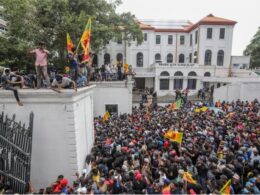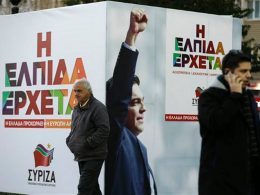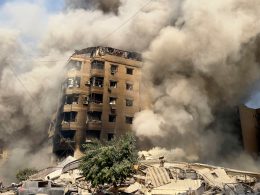The Greek working class has put up an incredible struggle against the vicious austerity measures raining down on them. Since 2010 Greece has been rocked by 17 general strikes, three of them lasting 48 hours. A prime minister has been removed and a government brought down. After some quiet months a one-day strike was called for 26 September. The following day Andros Payiatsos, leader of Xekinima spoke to the Socialist Party. Xekinima is the Greek section of the Committee for a Workers’ International.
After a quiet summer is the Greek struggle back on the agenda?
One of the biggest strikes and demonstrations in the recent period in Greece took place on Wednesday 26 September. There have been small sectional strikes all along but nothing on this scale in the recent months. We estimate about 100,000 in the streets of Athens, which is big, and many tens of thousands in other cities in the rest of Greece.
The mood was good on the demo. It was quite determined and rather optimistic – this is in contrast to the mood in the previous period. After the victory of New Democracy in June and the formation of the new government a lull developed because there was a feeling of ‘we can’t get rid of them’ following the elections.
But this lull was partially overcome by the size of the demo. Also the Greek people are watching with intense interest what is taking place in Spain and Portugal. This has given them hope.
The “Guardian” (London) reflected some of the anger:
Echoing a view held by many Greeks, Penelope Angelou, an unemployed mother, said passing the measures would be tantamount to a “parliamentary coup”.
“These parties were given our vote back in June because they promised to re-negotiate the terms of the loan agreement,” she said, referring to the onerous conditions of the bailout accord Athens signed with its “troika” of creditors — the EU, ECB and IMF – earlier this year. “We are all tired,” she said. “This is the third year of non-stop cuts and tax increases which have made us poor and divided us as a society. And they have not solved our problem. The recession is going from bad to worse.”
Given the situation people must have little confidence in the government?
New Democracy is in deep crisis and its supporters are deserting the ship. Samaras was elected on the basis of forcing the Troika to renegotiate the memorandum but in fact he’s heading in the other direction.
Is the effect of austerity on people’s lives a factor?
It’s a desperate situation for the masses because the situation already is extremely bad. According to the EU statistics of July 68% of the population lives below the poverty line – this is a staggering figure. But it’s realistic – we know because we live here. It’s the first time they are giving the figures that reflect the effect of their policies.
Unemployment is now officially at 23.6%. This official figure, of course, hides all those who have just given up looking for a job. And youth unemployment is an unbelievable 55%. So this is an absolute catastrophe for Greek society.
Then, in these conditions, they try to impose further cuts of €11.5 billion in the course of two years – this is more than 5% of the GDP of the economy.
Unsurprisingly there is a mass exodus into migration and into the countryside; back to the villages where people can survive by living with their families and maybe cultivating a bit of a living from the land.
All the youth are thinking of leaving the country. It’s a mass phenomenon – there are no youth, particularly university students who can see any point in staying in the country – although they want to stay in the country. Even left activists who want to stay and fight – they have no options as this is not just poverty – this is absolute emiseration.
Can you comment on reports that the opposition movement has reached the police and army?
For the whole of September we have seen protest action by state forces. Sections of the police have gone on strike including protesting against the riot police. Yesterday there was a press statement by the firefighters who said we refuse to be used by the state to suppress demonstrations. This is a he crisis in society and in the economy and it is even reflected in the security forces and we have seen demonstrations by army officers.
What way forward does Xekinima suggest?
We call for a clear plan of a programme of repeated sectional and general strikes and mass occupations of workplaces with the concrete aim of bringing down the government.
This is the slogan we have used for the past weeks and especially yesterday. It is going down very well. You can hear it everywhere.
We especially appeal to the public utility unions which are at the centre of the storm.
The initial response of the Greek people to the call for a 24-hour general strike was, ‘this is nothing, this is ridiculous’, ‘we can’t bring the government down with one 24-hour general strike and they won’t come down even with one 48-hour general strike’. ‘We need something much much more than that’. So there is a mass tendency in the direction of an all-out strike. If the union leaders were to call it they would get a huge response – but they won’t. They just want to let off steam.
You can also say now that nearly the whole of the left – excluding the majority in the leadership of Syriza – accepts the programme (which we initially posed from the beginning of 2010 when the debt crisis came to the fore) that the debt cannot be paid, that the banks have to be nationalised, that the commanding heights of the economy have to be nationalised, and it has to be put under democratic control of society. It’s also accepted by millions of people whether they take part in the demonstrations and strikes or not.
The question now is how to build a movement on the ground to bring the government down and to replace it with a left government which will be pushed by the mass movement to implement this programme.
We also explain the need for the whole of the Southern Europe to be united in huge and unbeatable/invincible struggles.
Golden Dawn has been rising in the polls. What does this signify?
Golden Dawn did not take part in yesterday’s demo – they never take part in workers’ demos, only some of them on the side of the riot police. But that does not mean they are not a factor, they are the only force in society which is rising in the polls. Apart from Golden Dawn, all the parties are falling in the polls. While in some polls Syriza is now the most popular party because New Democracy has fallen more, the fact that the left is also falling in the polls is something which should warn the parties of the left.
But at the same time it’s correct to say that Golden Dawn itself may have gone through its, let’s say, golden period. They’ve been using violence since 6 May elections every day – attacking migrants, attacking lefts, attacking LGBT people, etc. This has been creating an impression that they are a very determined force which contributes to why people go behind their banner and support them in the polls. But it’s starting to consolidate a resistance.
For the first time we have had a number of counter demos that have pushed them back which is very important. This is the first time they are starting to feel defeat. On one occasion we had migrants mobilising against them and pushing them back when they tried to attack them. This is very important, but needs to be linked to a wider movement.
Xekinima’s national initiative to build mass anti-fascist local committees and campaigns is very successful with some fantastic effects. We think that the movement is beginning to respond. We hope that we’ll be able to push them in a corner but at the end of the day the perspectives for GD and the far right mainly depends on the role of the parties of the left. We are fighting to push these parties in a more leftward and determined direction, while at the same time striving to build support for Xekinima and the ideas of revolutionary socialism – this is the only way the crisis can be solved.
Greece – the unfolding social tragedy
The savage austerity policies, implemented in Greece by the ruling class, the government and the Troika of the EU, ECB and IMF have already had disastrous effects on the lives of millions. Living standards have crashed as a result of mass unemployment, the onslaught on wages, and tax rises in combination with the huge cuts in social welfare and the complete destruction of social benefits and the social state. With no exaggeration the Athens Doctors Association wrote to the government of the danger of a humanitarian crisis taking place in the country if the ‘new’ austerity measures of €11.5 billion are implemented. Nikos Kanellis, Xekinima, CWI in Greece, writes of the impact of austerity on the lives of those who bear no responsibility for the crisis.
Public health collapses
The public health system is being destroyed day by day. Public hospitals are often short of the necessary materials for proper and safe treatment of patients. There is a shortage of nurses and doctors and tens of clinics in different hospitals are closed because of the cuts.
It was reported that patients at the Leros mental health hospital were malnourished because public funding fell short of covering the food needs of the hospital. This is not the only such case.
Pharmacists refuse to give any more medicine on credit as the government refuses to provide the necessary funding to pay back old debts. Pharmacists say they cannot buy new medicine from big medicine dealers whose policy is upfront cash. Those who suffer from serious and permanent conditions and diseases (such as diabetes, heart conditions, or cancer) need hundreds of euros every month in order to stay alive.
The Athens Doctors Association reported that numerous people who have no health insurance visit the Social Clinic of Athens (organised by the Association and the church) for free medical treatment. There are cases of people who were diagnosed with cancer but could not afford to be immediately operated on. They even reported pregnant women who put their life and their child’s life in danger because they could not spend the €800 that are needed for a cesarean.
Mass unemployment and poverty
At the same time poverty is expanding day by day on a mass scale. Millions live close or under the poverty line. According to an EU survey last July, a staggering 68% live below the poverty line – compared to 21% back in 2009!
According to recent research by the GSEE (Greek TUC) the real income of working class people has returned to the level of the late 1970s. This is not only the result of mass unemployment, which has now officially reached 23. 6%, or 1,168,761 people with 1,000 people losing their job every day. Young people and mainly women are the more affected as youth unemployment is 53.9% (for people between 15 and 24) and 62.1% for women at the same age.
Given the fact that 59% of unemployed search for a job for more than a year (long-term unemployment) it is no exaggeration to speak of a ‘lost generation’. Young people, the most dynamic part of society, are out of production and this pushes greater and greater numbers to take to the road of migration. 25,000 Greeks migrated to Germany alone during 2011 and this tendency will develop as the social disaster spreads.
Workers in vice-grip of poverty
Poverty does only have to do with unemployment. More and more workers are unable to make ends meet as their wages are slashed. The minimum wage is now around €480 a month (since the second memorandum, voted on 12 February) and for those under 25 and on ‘training schemes’ 430 € a month.
It is also officially estimated that around 400,000 people work but they are not being paid on time and in many cases this would mean getting paid with a delay even of three or four months or nine months. According to the GSEE only 10% of the workforce in the private sector are being paid on time.
Now the Troika and Greek ruling class demand that workers in Greece work six days a week and up to 13 hours a day. This means that working hours per week will rise from 40 to 78 and at the same time as workers will be less protected from being fired. If these plans are put into practice, on top of all the attacks of the last two years, the working class will be turned into slaves.
These attacks have left tens of thousands of people homeless and around 250,000 rely on soup kitchens organised by the church and the charities. In Crete, one of the wealthiest areas of Greece, it is estimated that 8,500 families are dependent on ‘social supermarkets’ in order to cover their everyday food and other basic needs. ‘Social markets’ organised by local councils, charity organisations or left-wing volunteers, distribute food and basic goods for free to the poorest people.
Suicides and depression
The fear of unemployment and poverty, the debts that are accumulated by thousands of families, the uncertainty of what is more to come in the future are the bases of mass depression among big layers of society. The numbers who ask for psychological help have risen by 20-30% and suicide attempts have risen by 22% over the last two years.
The whole society was shocked in late May when a 60 year old unemployed musician committed suicide together with his 90 year old mother, jumping from the roof of the block of flats where they lived. In the letter that was found, the man explained that because of unemployment he was not able to continue to take care of his mother who suffered from Alzheimers and he could no longer stand asking for charity and food from others. In his last poem he condemned the bankers and the rulers for the drama of Greek society urging society to seek revenge and to throw off those in power responsible for this situation.
The hope of struggle
And actually this is the only way forward, the struggle for the overthrow of the government and the ruling class that turns the lives of millions into a tragedy. Over the past two years millions have come to the streets again and again in 17 general strikes, three for 48 hours, and numerous mass protests. There have also been heroic sectional strikes, demonstrations and occupations.
Leftward radicalisation and hope for change was expressed in the elections of May and June with the mass support and vote for Syriza. But until now the working class and mass movement hasn’t succeeded in the struggle to bring down the government, Troika and the rule of the capitalist class. This is in large part due to a lack of a mass socialist and revolutionary party. The building of these forces is the task of all genuine socialists and working class militants.












